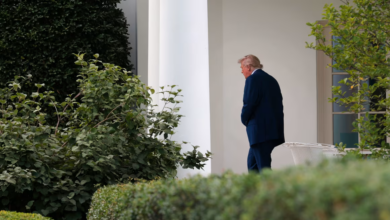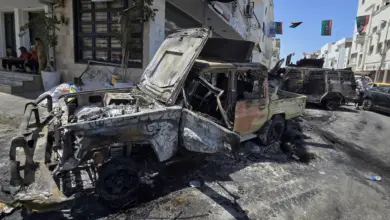BRUSSELS – The determined resistance by forces loyal to ousted Libyan leader Muammar Qadhafi is "surprising" because the fighters can't hope to reverse the situation on the battlefield, a NATO spokesman said Tuesday.
The comments by Col. Roland Lavoie appeared aimed at pressuring the former strongman's troops to lay down their weapons and engage in talks with one-time rebels who now rule the Arab country, thanks largely to NATO firepower.
Instead, in places such as Sirte, Qadhafi loyalists are still fighting, even though they can no longer be resupplied after the new government's units won control of key parts of the town's center, Lavoie said.
"So from that perspective, it just does not make sense to see what these few remaining forces are doing," he said. "This could certainly be qualified as surprising both from military and political point of view."
Critics of NATO's campaign have warned of the danger of protracted armed resistance against the new governing authority led by the National Transitional Council. The NTC has refused repeated attempts by the African Union and others to mediate between the warring parties.
NATO has said it would end its 7-month-long bombing campaign once it is clear pro-Qadhafi remnants no longer present a significant threat. But for the time being it is keeping up airstrikes, mainly against targets in Sirte, Qadhafi's hometown, and the town of Bani Walid, where pro-Qadhafi forces remain in control.
The alliance has been criticized for allegedly misusing a UN resolution in March authorizing the use of force to protect civilians in Libya to justify months of airstrikes aimed at overthrowing Qadhafi's regime. NATO warplanes have flown about 9500 strike sorties during that period.
After a long stalemate, the air raids paved the way for the advance of opposition forces and the capture of Tripoli and other major population centers in the past two months. Opposition forces are now moving on Bani Walid, Lavoie said.
"We have no evidence of significant pro-Qadhafi presence or activity in the rest of the country," he said.
The operation in Libya has been cited as proof that the Cold War alliance remains relevant to international security. But the campaign also has revealed deep rifts within the military bloc, only eight of whose 28 members participated. The others stayed away – mostly out of concern of how the new mission would affect the alliance's commitment to Afghanistan.
Lavoie also said NATO has no information about the thousands of portable surface-to-air missiles that are reportedly missing in Libya.
Last week, the German news magazine Der Spiegel said the alliance has lost track of at least 10,000 surface-to-air missiles from Libyan military depots. These include the small SAM-7 shoulder-launched, surface-to-air missiles which the US and other Western nations fear could be used by terrorists to target civilian airliners.
Lavoie said that since NATO did not have forces on the ground, it's up to Libya's new authorities to account for such munitions.




